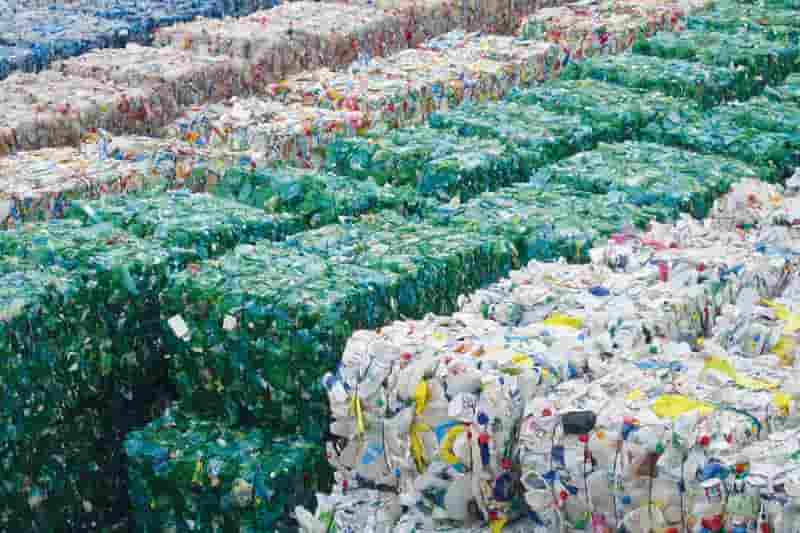ITMA – Textile recycling – Smart-fabric 09-05-2023 - Arhive
ITMA – Textile recycling – Smart-fabric
Crude Oil Prices Trend
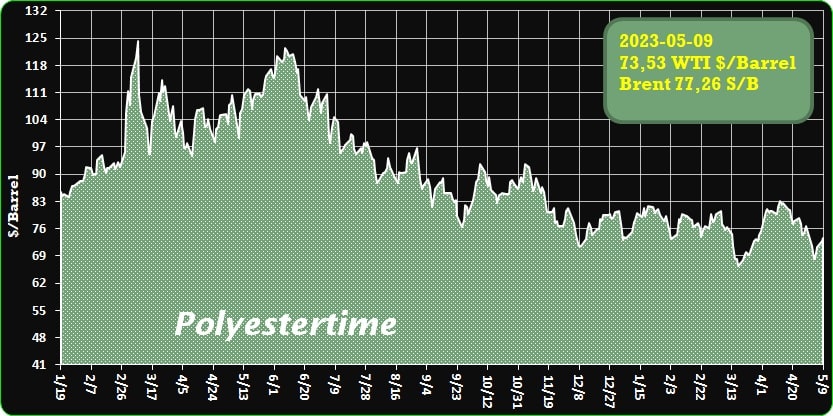
Crude Oil Prices Trend by Polyestertime
-Andritz, an international technology group, will showcase its latest nonwovens production and textile recycling solutions at the upcoming ITMA in Milan, Italy, from June 08 to 14
At ITMA, Andritz’s key theme will be sustainability. The company’s nonwoven production solutions and products are classified as sustainable, supporting customers in achieving their sustainability goals. ITMA – Textile recycling – Smart-fabric
Andritz’s sustainable products include airlay, spunlace, and needlepunch lines, bast fiber processes using 100% bio-based, natural fibers and/or recycled fibers, Wetlace and Wetlace CP lines to produce biodegradable wipes, and needlepunch lines equipped with web weight correction systems.
Andritz will also present its PA.3000 elliptical cylinder pre-needler, which features new capabilities to “freeze” the evenness of the fabric and has more than 70% extra surface-impact needling capacity than existing technology.
In addition, Andritz will highlight its ProWin technology for profile web weight correction, which optimizes fabric evenness and provides a faster return on investment in the needlepunch market segment. ITMA – Textile recycling – Smart-fabric
Andritz will also present its industrial digitalization products and services under the brand name Metris, which includes the all-in-one digitalization platform that provides full support for industrial plants throughout their entire life cycle.
Andritz is also at the forefront of the sustainable textile recycling movement, offering state-of-the-art recycling processes for pre- and post-consumer textile waste.
At ITMA, the company will present its textile recycling processes, including textile fiber preparation, mechanical and chemical recycling, and combined processes.
The ADuro F fine grinder, chemical/circular textile recycling technologies, and the Jumbo tearing module are among the products that will be showcased.
Moreover, Andritz has collaborated with Pellenc ST and Nouvelles Fibres Textiles to drive the shift towards an industrial-scale circular economy for textiles.
The three companies have teamed up to set up the first industrial line in France to combine automated sorting and recycling technology. ITMA – Textile recycling – Smart-fabric
At ITMA, the latest developments from this partnership will also be presented.
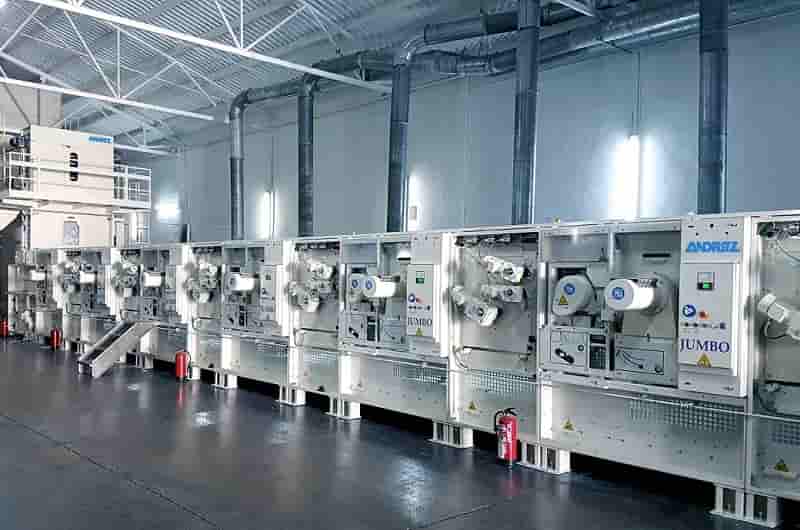
-Loop, SK Geocentric to deploy Loop’s technology in Asian market
Loop Industries, a Montreal-based technology company focused on promoting a circular economy for plastics, has partnered with SK Geo Centric Co. Ltd., a subsidiary of South Korea’s SK Group, to introduce Loop’s technology to the Asian market through multiple commercial manufacturing facilities.
The joint venture agreement stipulates that the venture will have exclusive rights to commercialize Loop’s technology in Asia for a specified period, with SK Geo Centric owning 51% of the venture and Loop owning the remaining 49%.
Loop’s PET resin for packaging and polyester fiber applications will be provided by the planned commercial manufacturing facility in Ulsan, South Korea, with an annual capacity of 70,000 metric tons using Loop’s Infinite Loop technology.
The two companies plan to build three more commercial manufacturing facilities across Asia by 2030, in addition to the facility in Ulsan. ITMA – Textile recycling – Smart-fabric
SK engineering, a subsidiary of the SK Group that specializes in engineering and construction, will collaborate on the project.
According to Loop, Asia’s PET and polyester fiber market is the world’s largest, and converting low-value PET and polyester fiber into recycled, virgin-quality Loop PET resin can help reduce reliance on finite resources and minimize environmental impacts.
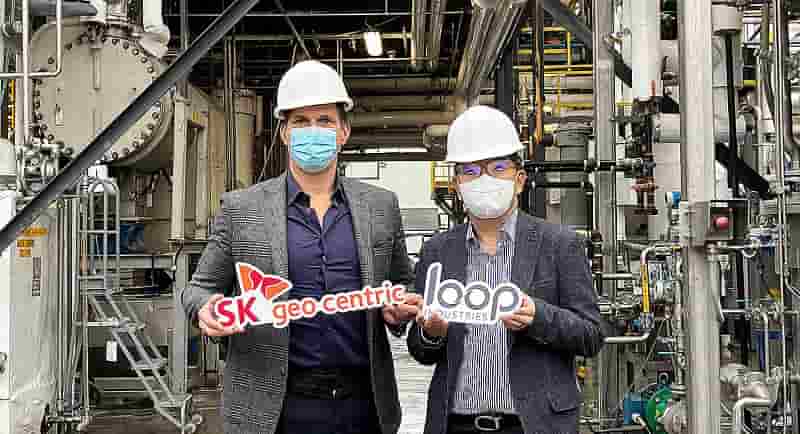
-‘Holistic’ Recycling of CFRP Pioneered by Germany’s Pyrum
Germany’s Pyrum has pioneered a “holistic” recycling process for carbon-fiber-reinforced plastic (CFRP), marking the first time that the material has been recycled in such a way. Pyrum, which specializes in end-of-life tire recycling via pyrolysis, has commissioned what it claims is the first automated, semi-industrial recycling plant for CFRP. The material is used in various industries, including automotive, transportation, construction, and electronics, and its increasing use has prompted concerns over its disposal, which currently involves landfill or incineration.
Pyrum’s recycling process is energy self-sufficient and can recycle 1 kg of CFRP per hour. In addition to recovering fibers, the process also produces pyrolysis oil, which is already sold profitably to the chemical industry through Pyrum’s tire recycling activity. The Infinity Project, led by the Fraunhofer Institute for Casting, Composite, and Processing Technology (IGCV), involves several partners and has received €170,000 in investment, mainly from government grants. ITMA – Textile recycling – Smart-fabric
Pyrum is the first company in the end-of-life tire recycling sector to receive REACH registration from the European Chemicals Agency (ECHA) for the pyrolysis oil it produces. This means that the oil is officially recognized as a raw material that can be used in production processes. Additionally, Pyrum has received ISO 14001 certification for its environmental management system and ISO 9001 certification for its quality management system.
Pyrum CEO Pascal Klein stated that the company is committed to promoting a sustainable and circular economy, and that they plan to contribute to this through not only end-of-life tire recycling, but also the recycling of CFRP. The commissioning of the first automated, semi-industrial plant is an important milestone for the recycling industry and a significant step towards building the first industrial plant. The Fraunhofer Institute has also confirmed that Pyrum’s proprietary pyrolysis process saves significantly more CO2 emissions than current recycling processes for end-of-life tires.

-Lumiweave: the new fabric that stores solar energy is the revolution for awnings
Introducing Lumiweave: the revolutionary fabric that harnesses and stores solar energy, making it the ideal awning solution for anyone looking to make a positive impact on the environment.
This innovative fabric not only provides shade from the sun’s rays during the day but also illuminates the night with its stored solar energy, making it an efficient and eco-friendly solution.
In a world where it’s increasingly important to find sustainable solutions to safeguard the environment, Lumiweave is a significant step forward.
This product showcases how designers, architects, and engineers can collaborate to create useful and sustainable accessories that promote a more environmentally conscious lifestyle. ITMA – Textile recycling – Smart-fabric
Lumiweave is essentially a photovoltaic panel made of fabric that captures and converts the sun’s rays into electricity, making it a reliable and renewable energy source. By using this fabric as an awning, it’s possible to lower the temperature and make the heat bearable, making it the perfect solution for urban shading. Additionally, the installation of Lumiweave is extremely simple and fast, unlike traditional photovoltaic cells.
One of the most significant advantages of Lumiweave is that it does not have any impact on the environment, making it an eco-friendly choice. By harnessing the sun’s energy, it can produce light for the night hours and save significantly on electricity bills. Lumiweave is also completely autonomous, which means it doesn’t require any other structures, means or energy sources other than solar energy.
Furthermore, Lumiweave’s potential benefits extend beyond personal use, as it has the potential to be used in the creation of shading systems that can cover entire cities. This will lower temperatures and reduce the need for harmful equipment like air conditioners and fans, which have adverse effects on both humans and the environment.
In summary, Lumiweave is a cutting-edge, modern tool that not only helps protect the environment but also creates unique and incomparable outdoor experiences. By choosing Lumiweave, you can save on consumption, reduce your carbon footprint and help preserve our planet for future generations. ITMA – Textile recycling – Smart-fabric

-Domo Chemicals – Polyamide Compounding Line in India
Domo Chemicals, an engineering plastics supplier, has launched a new compounding line at its facility in Mahape, Navi Mumbai, to meet the growing demand for its polyamide-based solutions in the automotive, electrical & electronics, consumer, and industrial goods sectors. This move is a part of the company’s expansion plan in the Asia region, where it has experienced double-digit growth in its overall operations.
The new compounding line will have a total capacity of 8,000 tonnes/year of engineered materials based on polyamide, and it is equipped with the latest technology to serve customers in India.
Fabrizio Cochi, General Manager Asia, expressed the company’s commitment to growth and innovation in the Asia region and emphasized that the new compounding line is a milestone in achieving this goal. ITMA – Textile recycling – Smart-fabric
Domo Chemicals has been operating in Navi Mumbai since 2016 and has established a technical center with advanced facilities to develop new solutions for the Indian market. These solutions include lightweighting and metal replacement, electrically friendly and flame-retardant materials for e-mobility, food- and water-contact grades for home appliances, and automotive cooling solutions.
Apart from expanding its operations in India, Domo Chemicals has also signed a manufacturing contract with Mika Inc. for Technyl solutions in South Korea and has planned to increase its capacity in China up to 50,000 tonnes/year by the second quarter of 2024.
The company’s new plant in Haiyan will facilitate this expansion, making it possible to meet the growing demand for its solutions in China. ITMA – Textile recycling – Smart-fabric
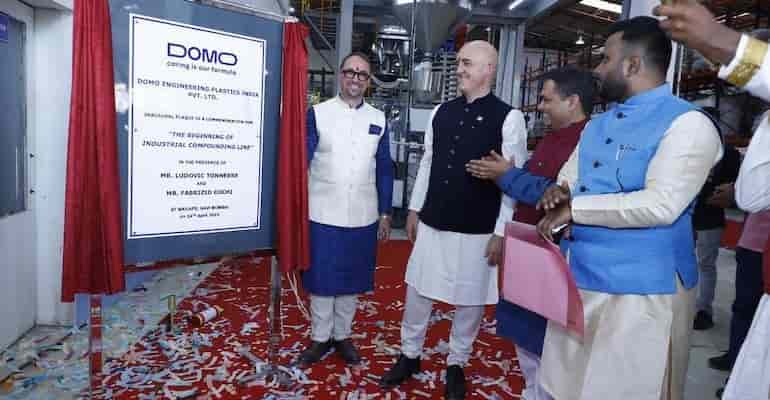
-A recent trend study by German consulting firm Ecoprog has found that the number of chemical recycling projects for waste plastics is on the rise globally
Ecoprog has tracked close to 180 plants and projects worldwide, with over 140 chemical recycling projects in various stages of development identified by early 2023 – an increase of 50 projects compared to the previous year.
The number of projects in the construction stage has doubled, with pyrolysis being the main technology used in the majority of the projects.
The number of operational plants has also increased from 20 to 37, which together can treat nearly 145,000 tonnes of waste plastics per year.
However, most of these plants are research facilities and not commercial projects, according to Ecoprog. ITMA – Textile recycling – Smart-fabric
The increasing number of plants and project announcements “can be seen as an indication that this technology continues to develop towards a booming market,” said the consulting firm.
Ecoprog also noted that chemical recycling continues to involve companies from several sectors, including chemical and oil companies investing to produce feedstock for fuel production, start-ups and technology suppliers seeking to develop and commercialize chemical recycling technologies, and plastics producers and converters “exploring opportunities to enhance recycling practices.”
However, the study’s authors also concluded that “chemical recycling remains controversial.” Chemical recycling offers the future potential to fully recycle plastics without downcycling and could potentially recycle even contaminated and mixed waste streams that currently cannot be mechanically recycled.
Nevertheless, chemical recycling is continuously criticized for its CO2 footprint, and it also remains uncertain to what extent chemical recycling will become economically viable. To date, there is “a lack of regulation in many countries and regions,” particularly with regard to whether chemical recycling’s input and/or output streams can be classified as recycled.
Ecoprog’s “Trend Study Chemical Recycling” offers analyses on the technologies, market factors and developments, plant inventory, projects, and competition in the field of chemical recycling worldwide. ITMA – Textile recycling – Smart-fabric
The study is available for purchase on the website www.ecoprog.com for €1,800 plus VAT.
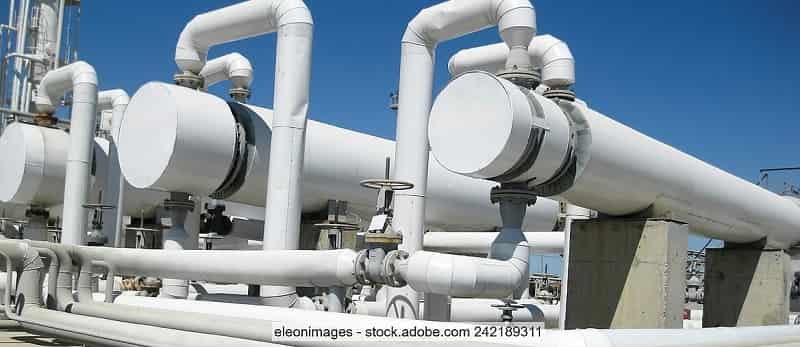
-The controversy surrounding chemical recycling remains a hot topic, with ExxonMobil recently opening a large-scale plant in Texas with plans to recycle over 80 million pounds of plastic waste annually
While oil companies are proponents of chemical recycling, environmental groups accuse them of masking the plastic pollution problem.
Traditional mechanical recycling is limited, as most plastics cannot be recycled in this way.
Chemical recycling involves heating plastic to high temperatures and then breaking it down, allowing it to be remade into virgin-quality plastics for medical and food applications.
Supporters argue that this type of recycling can take care of the 90% of plastics that are currently not recycled. ITMA – Textile recycling – Smart-fabric
However, critics argue that the pyrolysis process emits toxic chemicals and consumes large amounts of energy and water, making it inefficient and not a true recycling solution.
Additionally, some argue that chemical recycling continues to perpetuate fossil fuel usage, as broken-down plastic becomes synthetic crude oil before being turned back into plastic.
Environmental justice concerns have also been raised, with many recycling plants being built in low-income and minority communities.
The only real solution to plastic pollution is to reduce its production, although chemical recycling remains one of many strategies being pursued by industries.
